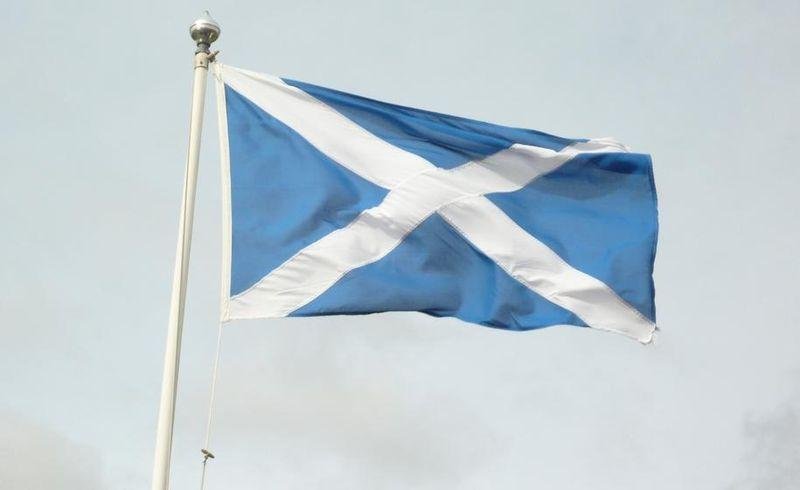The flag of Scotland (CC/ wikimedia.org/ Flicktrickr)
ABERDEEN, Scotland, Sept. 16 (UPI) -- Scotland, with a population of 5.2 million and a history of unified government with the United Kingdom dating to 1707, will decide Thursday in a binding referendum if it will become a separate nation.
Only the four million eligible voters, Scottish residents age 16 and over -- 97 percent of whom are registered to vote in the referendum -- can vote on the Electoral Commission's question, "Should Scotland become an independent country?"
Polls have suggested a tight contest, with recent momentum swinging in favor of the "Yes" camp. A Sept. 13 survey by the survey company Panelbase indicates 49.4 percent of respondents favoring a "Yes" vote and 50.6 percent prepared to vote "No," with previously undecided voters now tending to favor a "Yes" vote to start a new country, although pollsters admittedly have little in the way of precedent for their research and findings.
The campaign group Yes Scotland has faced off against Better Together, each side lining up endorsements, funding and support from political parties, businesses and individuals. Celebrities, Scottish and otherwise, have made their feelings known whether they favor independence -- actor Sean Connery, film director Ken Loach, animated The Simpsons cast member Groundskeeper Willie -- or remaining within Britain -- author J.K. Rowling, actress Judi Dench and rock stars Paul McCartney, David Bowie and Mick Jagger.
For many, especially those in the yes camp, it is an emotional issue, freighted with a history of Scottish independence attempts and wars with England dating to 1296. Connery said that "as a Scot with a lifelong love of Scotland and the arts, I believe the opportunity of independence is too good to miss."
The more important issue may not be the day of the vote, but the day after. The referendum, however it is resolved, will not be undone; this is a decision that will last for generations. British Prime Minister David Cameron, speaking emotionally in Aberdeen, Scotland, Monday, said as much, pointing out "There's no going back from this, no rerun," in urging voters to keep together a country "that all of us call home." Questions serious and trivial have not been resolved.
Separate Scotland from England, Wales and Northern Ireland, and suddenly the land, a part of the United Kingdom since Queen Anne was on the British throne, must deal with its own economy, international relations and energy policy. Will Scotland be a part of NATO and the European Union? What becomes of pensions administered by the government in London? What of immigration and controlling the border, and the British nuclear submarine fleet, based in Scotland's Firth of Clyde?
Is the British Queen still the Scottish monarch? Is the pound, regulated in England, still the official currency? Will the Union Jack, the British flag that is an overlay of British, Scottish and Irish regalia, due for a makeover?
A yes vote would launch an 18-month transition period in which some of the answers would be determined. The separation, if it comes, would be in March 2016.
The vote Thursday is also being closely watched by other nationalist movements around the world, to see how gracefully Scotland exits the United Kingdom if the referendum passes. To one extent or another, Spain's Catalonia, Japan's Okinawa, Germany's Bavaria and even Canada's Quebec and the United States' Texas have some measure of support for their own secession and independence.
Scotland, however, regards itself as confident, educated and riding on a windfall of North Sea oil.
Approval of the referendum Thursday would be a victory for the Scottish National Party, which has been pushing in favor of independence. Its leader, Alex Salmond, has been the most visible face in the campaign since it began in 2012.
Whatever the result of the vote, Scotland will find itself with unaccustomed autonomy. A letter to a Scottish newspaper Monday signed by Cameron, representing Britain's Conservative Party; Nick Clegg of the Liberal Democrats and Ed Milibrand of the Labor Party, promised Scotland undefined but "extensive new powers" to the Scottish Parliament if Britain stays intact. The Scottish Parliament already has authority, granted in 1998, in matters pertinent to local agriculture, education, the environment, health, local government and justice.
The last-minute promise was derided by a spokesman for Salmond, who said the three political leaders were "willing to say anything in the last few days of the campaign to try to halt the yes momentum -- say anything except what new powers, if any, they might be willing to offer."
A vote to reject independence, or to embrace it, in a referendum this close suggests half the Scotland's population will be unhappy Friday morning. The outcome of the referendum is likely only the start of putting Scotland's future more squarely in the hands of the Scots.















